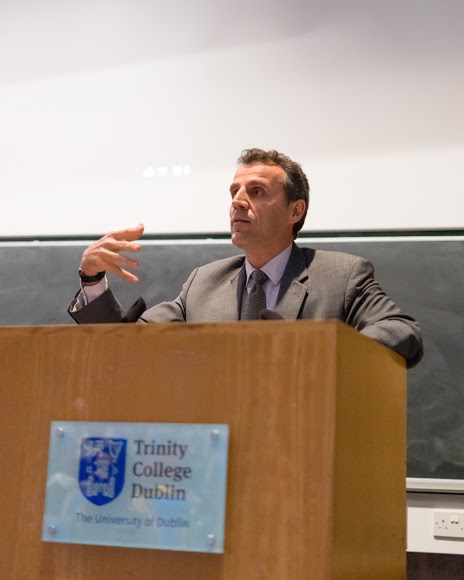
The topic of discussion was mainly centralised on Brexit and the future of Europe. Mr. Crouzat began by cementing the links between Ireland and France through his belief that France’s opinion on Brexit negotiations firmly lie with Donald Tusk, who said “if the UK offer is unacceptable for Ireland it will be unacceptable for the EU”. Ireland and France have an important trade relationship; one which Mr. Crouzat emphasised as having become even more vital now that the UK have begun the process of leaving the EU. Trade with Britain is of great economic importance for both our countries, and as a result of Brexit, it is now of the utmost importance that we improve our trade relationship, a matter which Macron believes must start with the development of maritime routes and the exploration of new avenues of trade.
Next, Mr. Crouzat began discussing Macron’s vision for Europe, as best summed up by his quote, “the union of twenty seven member states must be stronger than twenty eight member states minus one”. According to Macron, there are seven areas of changes that must be made following Britain’s exit from the European Union, the first of which concerns the defense of Europe. Permanent Structured Cooperation (PESCO) is a security cooperation within the EU’s military framework. Its aims are the protection of Europe, and enhancement of the member states defense forces. Currently, there are twenty two member states, and Ireland has yet to join. Migration is currently a major issue for Europe. Macron hopes for the creation of a common asylum, and European force for border control. He also hopes to have a common, and united policy surrounding the integration of migrants into their host country.
As for the EU’s foreign policy, both Macron and Varadkar believe that Africa is a key area in need of EU attention. Both believe a “European Marshall Plan,” is essential, as despite Africa’s growing population, it may pose a serious threat to Europe’s migration if left unaddressed. Sustainable development in terms of climate change was also an issue in need of addressing, as are further economic integration and taxation. The issue of taxation caused great disagreement between our two countries. However, my interest was truly peaked by his propositions for Culture and Knowledge within the EU. These were that all young Europeans spend at least six months in another European country, and be able to speak two EU languages by 2024. Macron hopes that a network of European universities could be created in order to achieve this, and with the Erasmus programme already in place, students will be able to attend classes in two languages.
The Q&A ended with Mr. Crouzat revealing his love of music, particularly of the classical and jazz persuasion, as well as his fondness of visual arts and theatre, both of which Dublin is rich with. As a French student, and a diplomat’s daughter, I truly appreciate the insight into contemporary politics which I was fortunate enough to receive. Although I personally don’t know what awaits Europe on the other side of these negotiations, I believe Mr. Crouzat summed it up perfectly when he said “it’s impossible to square a circle”.






